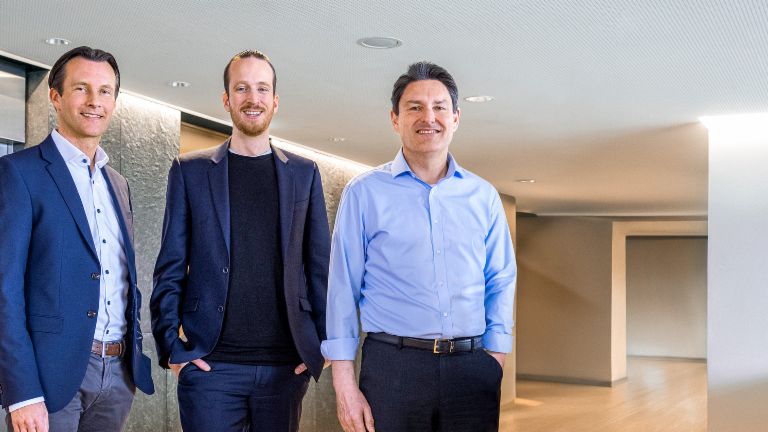EOS 2021 Chatbot Survey: How employees and customers profit from AI.
Chatbots relieve employees of simple tasks – giving them more time for more complex customer issues and increasing their satisfaction. But will human service remain important in a future with highly intelligent chatbots?
- Use of chatbots increases employee and customer satisfaction.
- Chatbots still offer a lot of potential for cost savings in companies.
- In the future, chatbots are not going to replace employees – they are going to work closely with them.
“I am on your website right now and want to make an installment payment, but it’s not working and I don’t know why.” Around one and a half years ago, it was still the case that employees from the service center at EOS Contentia – a national subsidiary of EOS in Belgium – were probably going to need a long time to handle these types of calls from defaulting payers. EOS Contentia is one of Belgium’s leading providers of debt collection and debt purchase services in the utility, healthcare, and telecommunications sectors. The possible reasons for a failed transfer are countless – an error in the EOS online payment website itself is rarely one of them. To solve the problem, the EOS employees thus began to probe the most important potential sources of error one after another. And sometimes, in coordination with the customers, they also restarted the computer. Chatbot Tom has been assuming this often cumbersome routine chore since July 2020. “My colleagues are very happy to be relieved of this task,” says Wesley van de Walle, Tom Project Manager at EOS Contentia.

A chatbot prevents employees from having to handle easy tasks for which they are actually overqualified.
The latest chatbot survey conducted by the EOS Group in 2021 shows that not only at EOS do chatbots relieve employees of simple and monotonous tasks and thus increase their satisfaction. Of the 2,800 surveyed European companies, 64 percent agree with the statement that the digital assistants increase employee satisfaction. At the same time, customers also obviously value the fast help and the around-the-clock availability offered by the chatbots, as 62 percent of survey participants state that chatbots increase customer satisfaction. “That is even a win-win-win situation – because apart from employees and customers, companies also profit,” says Wesley: “For example, the colleagues from our service center have more time to dedicate to more complex cases, which often involve higher amounts.”
Chatbots save money and make companies more efficient.
A chatbot prevents employees from having to handle easy tasks for which they are actually overqualified, says Michaela Homann, Head of Technical Customer Communications at EOS Technology Solutions (TS) in Germany. For this reason, she is planning on also implementing a chatbot for defaulting payers in Germany in future. “Over the long term, this will save us money, which we can e.g. invest in new technologies,” says Michaela. As expected, this is also important to the surveyed companies: 62 percent see cost savings as one of the biggest advantages of chatbots.
There even seems to be a lot of room for improvement here: Of the 1,809 companies (65 percent of all survey respondents) already using chatbots, 58 percent only use them as initial points of contact for customers. The digital assistant only preselects a topic based on the query; a human service employee takes over after that.
In the future, too, the human factor will make the difference.
Instead, it is expected that the digital assistants and humans will cooperate much more closely in the future. Chatbots will relieve human employees based on their needs – even when it comes to more challenging tasks. “But even intelligent chatbots will not make decisions that require the assessment of all variables in situations and a capacity for empathy,” says Franjo. “On the other hand, the anonymous communication with chatbots in the sensitive area of debt collection helps lower the threshold for contacting us, for example, to obtain information about an account balance or payment deadlines.”
In the future, it will be even less important for customers to know whether it is a human employee or a bot helping them with such general issues, according to Franjo. For the companies participating in the chatbot survey, however, this differentiation is very important: 81 percent agree with the statement that there must always be transparency regarding whether the users are communicating with a human or with a chatbot.
“For companies, the transparent indication of chatbot use will also be important in the future – this is a question of honest customer communication,” says Michaela. “Customers should be able to tell the difference easily – whether it’s relevant to them is another matter.” However, it is clear that chatbots will become more human in the future. Of the survey participants, 57 percent expect that in ten years, bots will be able to detect and respond to emotions, for example. Furthermore, 55 percent assume that by that time, voice bots will have replaced text-based chatbots. It will always be important to involve colleagues from operational service in the introduction and development of chatbots, says Michaela. “They are directly in contact with the customers and know best where exciting use cases or hurdles to use lie.” The human factor will therefore continue to be what makes companies successful in the future.
Survey profile:
Within the scope of the chatbot survey, EOS conducted 200 computer-assisted telephone interviews in each of 14 European countries (Germany, Denmark, Belgium, Switzerland, Spain, France, Poland, Slovakia, Slovenia, Croatia, Hungary, Bulgaria, Romania, and Russia), or 2,800 interviews in total. The participating companies were selected according to headcount and revenue (at least 20 employees and at least 5 million euros in annual revenue (except for Croatia)). Another requirement was that the companies had to have contact with private customers.
Would you like to talk to our chatbot experts? Feel free to contact us.
EOS in Germany
Daniel Schenk
Head of Corporate Communications & Marketing Germany
Steindamm 71
20099 Hamburg
Germany
Photo credits: Gutentag-Hamburg, Andreas Sibler, Angelika Klein, Boris Kovacev
Explore more from EOS





